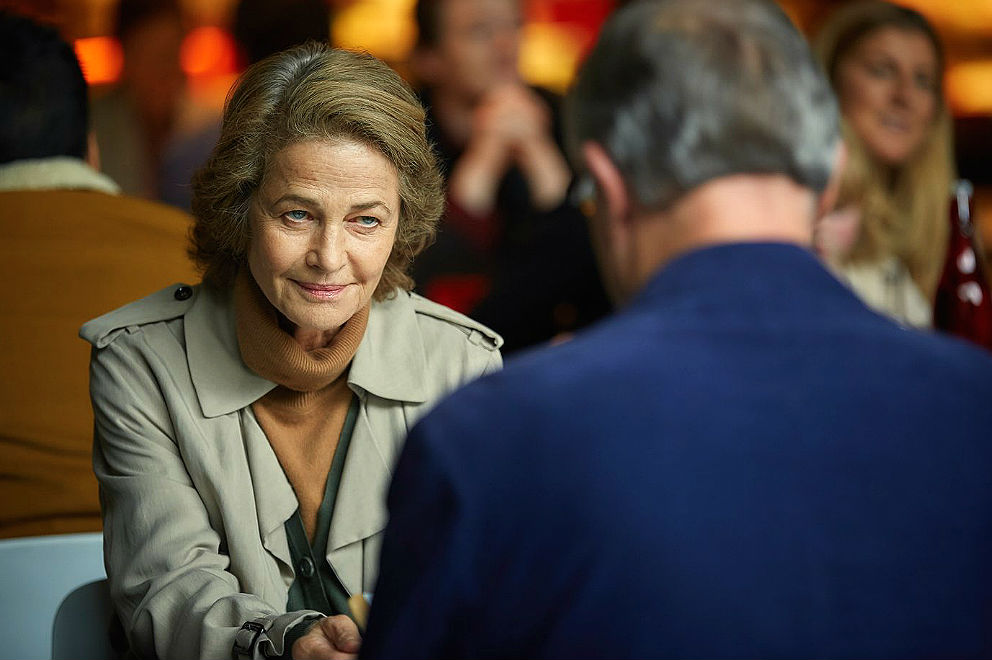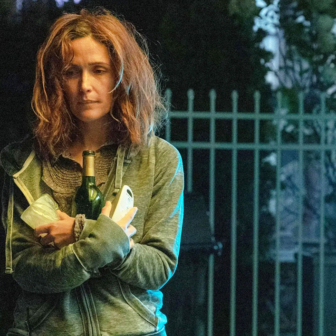Four of the most impressive films released recently come with an opening credit to BBC Films; three are co-productions, but all share a pervasively British tone. Most obviously, the co-productions – Denial (Britain/United States), Their Finest (Britain/Sweden) and Viceroy’s House (Britain/India) – feature mainly British casts, but they also deal with matters of political and social importance to British audiences. And all four, in different senses, are adaptations.
Since cinema’s earliest days, we’ve been used to seeing films based on literary works, most commonly novels and plays. The Sense of an Ending and Their Finest belong unequivocally to this category, derived as they are from novels by, respectively, Julian Barnes and Lissa Evans. Denial, with its screenplay by British playwright David Hare, draws on the American historian Deborah Lipstadt’s History on Trial: My Day in Court with a Holocaust Denier (2005). The fourth, Viceroy’s House, has its basis in significant historical events.
When the adaptation is from text to film, the idea of being “faithful” to the source is essentially unrewarding. Fidelity is great for relationships, but playing around is definitely to be preferred on the screen: it asks more of the film-maker, and of the audience. But when it comes to films that have their basis in actual events, do we require the film-makers to stick to the facts? Can they be allowed to play fast and loose with the historical evidence?
As an opening declaration, “Based on a true story” seems to me misleading in the sense that we expect a “story” to have a beginning, a middle and an end, the latter pulling together the interaction of character and event. Life tends to be a messier, much less organised business. A film whose name for the moment escapes me settled engagingly for “Some of this stuff really happened,” a locution that allows the film-maker scope for invention as well as re-creation.
Gurinder Chadha’s Viceroy’s House makes its drama from the partition of India in 1947, when Lord Louis Mountbatten was sent as Britain’s last viceroy to oversee the transfer of political control to the subcontinent and the creation of the separate state of Pakistan. Not having any specialist knowledge of this painful – for many, tragic – episode in Commonwealth history, I can’t vouch for how authentically it portrays Mountbatten, well-meaning but still running the country under British orders, going about his work. But most informed accounts of the film suggest that Chadha, whose grandparents fled oppression in Pakistan, has been essentially true to the historical facts, and the screenplay, by Chadha’s husband, Paul Mayeda Berges, certainly seems more interested in understanding the events than creating melodramatic excitements.
The film’s title refers to its chief setting, the palatial residence in which 500 servants carry out their appointed tasks and to which Gandhi, Nehru and others are invited to put their views forward. The Mountbattens (Hugh Bonneville and Gillian Anderson) are depicted as benign in their dealings with the people and the processes of transition, but there is an implied critique of the way the British rulers have dared to maintain so luxurious a lifestyle and are now seeking to protect their interests by the strategic drawing of Pakistan’s borders and other means.
Bonneville, trailing clouds of Downton Abbey aristocracy, and the American Anderson, with an impeccably English accent and demeanour, create a wholly believable pair as the Mountbattens, without resort to stereotypes. As well as the factual events on which the film draws convincingly, a fictional romance depicts young lovers torn apart by the wider political divisions. Touchingly played by Manish Dayal and Huma Qureshi, these may perhaps be seen as a personalisation of the political reality.
So, does it seem appropriate for a film story inspired by actual events to include a narrative strand that is the invention of the screenplay? If it is handled in such a way as to underscore the larger issues at stake, then I’d say yes, it does.
With The Sense of an Ending, we are on ground more customarily associated with the idea of adaptation. As one who dissociates himself from the notion of the “faithful” adaptation, I was set a challenge by this utterly absorbing film version of Barnes’s novel. When I re-read the book just before seeing the film, I was reminded how idiosyncratic it is. Watching it on the screen, directed by Ritesh Batra from a screenplay by Nick Payne, gave me the strangest feeling of watching the translation of a narrative in one medium into another that just happened to be using a language system consisting of audio-visual moving images. This is no mere reverential plod through the precursor text, even though virtually everything of importance has been transferred – as has so much of Barnes’s razor-sharp prose, whether in conversation or reflective discourse.
The protagonist of novel and film is Tony Webster, a divorced man in late middle age who runs a camera shop, keeps in intermittent touch with his former wife, Margaret, and their daughter Susie, and generally seems to be making his way without excitement towards his ending. Things begin changing when he receives legal notification that Sarah Ford, the mother of an early girlfriend, Veronica, has bequeathed him £500 and the diary of a school friend of his, Adrian Finn. But that account makes the novel and the film sound much more conventionally structured than is the case. On returning to the book those several years later, I was struck by how much it is preoccupied by the processes of memory, of reflection, and of tentative philosophical steps (“the more you learn, the less you fear”) towards understanding what his life has meant to Tony, in whose words the whole thing is narrated.
Almost everything I’ve said about the novel finds not so much its parallel as its reincarnation in the film. Tony (Jim Broadbent) will sometimes have access to the voice-over, film’s nearest equivalent of first-person narration. But, while his recollections of, say, schooldays or his first romance invoke film’s capacity for dealing fluidly with time and space, we never lose the sense that it’s all about Tony. All about him in the sense of how the past impinges on his present: how he relates to those who have populated his life and how he has treated them. The past is sometimes rendered in a flashback to schooldays, when the articulate Adrian challenges the received wisdom of a history teacher or the headmaster tells the assembled school of the suicide of one of their fellows, but sometimes it will be no more than a flash of memory that just barely registers in the older mind. And sometimes it will call that memory to account.
Two women will make their contribution to the recalled annals of the past. One is Margaret (Harriet Walter), whose pragmatism can pull Tony back into the present. (In one salvo, she accuses him of a “total inability to see what’s going on right under your nose.”) In these scenes, director and actors offer a most persuasive sense of how two people who once loved each other can maintain a rapport long after the passion has gone.
The other woman of consequence is Veronica, first seen as a carefree – and careless – teenager (Freya Mavor) and then, forty years later, as a woman to whom life has offered some serious challenges but who has nevertheless arrived at the kind of self-knowledge that has eluded Tony. As the older Veronica, Charlotte Rampling arranges to meet Tony to offer information about her mother’s will and the death of Adrian, conveying with stunning veracity and compassion a lifetime of coming to terms with painful truths. She only appears in the film’s last twenty minutes or so, but it has been worth the wait. Broadbent’s Tony, bumbling between eras, and Walter’s crisply spoken Margaret (she refers to Veronica as “the fruitcake”) are no less riveting company.
Indeed, all the acting is of the highest order, and the younger versions of Tony, his school chums and Veronica convincingly suggest the sixty-year-olds they grow into. Or do I mean the other way round? But this is a film that plays with time in ways that suggest past and present are by no means discrete entities. What they were then may well determine what they have become now; what they are now is of course irrevocably knitted into their often feckless pasts.
Because I finished re-reading the book a few hours before seeing the film, I can’t be sure that coming to the film version without the anterior experience won’t lead to some passing confusions, but I can only urge filmgoers not to let that deter them from taking on the film. There is a brilliant moment – and I mean moment – when, in a semi-flashback, the elderly Tony suddenly replaces his earlier self in the back of a car in which Veronica’s dad is driving them both to the station. It epitomises the film’s daring fluidity in matters of time, and effortlessly makes its point about what the memory may be up to. And could there be any more evocative way of placing an event in the past than the image of people in a restaurant smoking between courses?
There isn’t space to deal in detail with those other films I mentioned at the outset. Suffice to say that both Denial and Their Finest offer absorbing entertainments, having drawn their inspiration from works in another medium. Their Finest also “adapts,” in the historical sense, the work of the Ministry of Information’s film division during the second world war. Not having read Lissa Evans’s novel, I can’t know how closely Lone Scherfig’s film reproduces its narrative contours, but the ministry’s film work was an important contribution to wartime propaganda and morale, and the film – with its muted colours and chirpy tone – may be seen as adapting what would once have been a well-known aspect of the life during a tense period.
But it is The Sense of an Ending that has challenged my views on cinematic adaptation. Unlike the transpositions I’ve most admired, it seems less concerned with offering a new intellectual, emotional and philosophical take on the original than with translating it into a new signifying system. Does that sound dull? It’s not. Ritesh Batra (of The Lunchbox fame) and Nick Payne set out to make Barnes’s prose account of a life – or phases of it – available in the distinctive language of cinema, and have done so with much success. •




